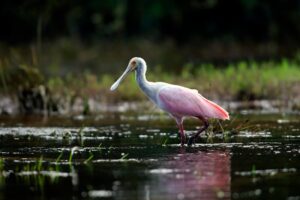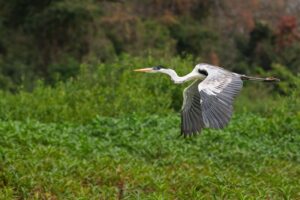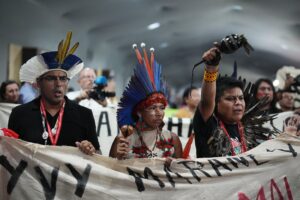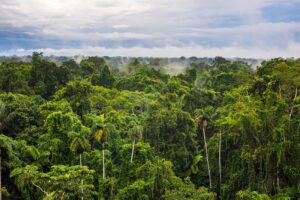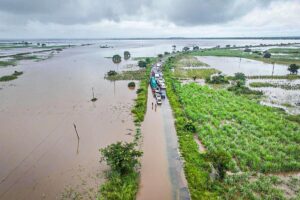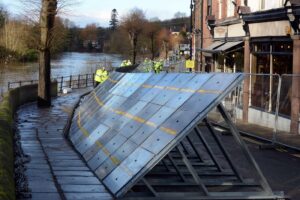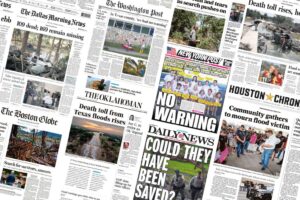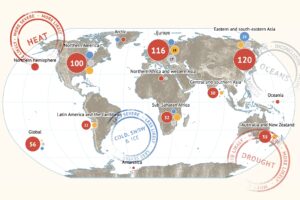
Photo by Suzy Hazelwood from Pexels
Episode 96: Crafting Compelling Personal Climate Change Stories
In this month’s Citizens’ Climate Radio episode, host Peterson Toscano and the CCR teams introduce a fresh approach to climate change storytelling by exploring personal stories as metaphors. While these stories are not explicitly about climate change, they reveal truths and perspectives that resonate with our climate work. Join us to discover how personal narratives can enhance and diversify our stories about climate change. You will also learn expert storytelling tips to apply when telling stories about climate change.
Using Personal Stories as Metaphors
Peterson challenges us to use personal stories, which hold significant meaning and energy for us, as metaphors for climate change. These stories, often about transitions, conflicts, or breakthroughs in our lives, can draw powerful parallels to our climate efforts. You’ll hear two compelling stories from the Citizens’ Climate Radio team members Erica Valdez and Horace Mo, each reflecting personal growth and resilience.
Horace’s Story: A Journey of Friendship and Belonging
 Horace Mo shares his experience of moving from China to the USA as a 16-year-old. Navigating a new culture and language, Horace found support and friendship in his roommate Kai, who helped him overcome language barriers and cultural differences. This story of adaptation and support mirrors the collective effort needed in climate work, emphasizing the importance of community and mutual aid. Horace reflects, “My English ability soared like a rocket with the help of Kai and other students at school. For the first time, I sensed a personal belonging to the school community.”
Horace Mo shares his experience of moving from China to the USA as a 16-year-old. Navigating a new culture and language, Horace found support and friendship in his roommate Kai, who helped him overcome language barriers and cultural differences. This story of adaptation and support mirrors the collective effort needed in climate work, emphasizing the importance of community and mutual aid. Horace reflects, “My English ability soared like a rocket with the help of Kai and other students at school. For the first time, I sensed a personal belonging to the school community.”
Erica’s Story: Confronting Hidden Challenges
 Erica Valdez recounts her high school friend Sophia’s (not her real name) struggles with college applications due to her parents’ undocumented status. Erica’s story highlights the hidden challenges marginalized communities face, drawing a parallel to the often-overlooked impacts of climate change on vulnerable populations. It emphasizes the need for empathy and support in both personal and climate-related contexts. Erica notes, “Witnessing her stress made me ask, how many people are going through something similar?”
Erica Valdez recounts her high school friend Sophia’s (not her real name) struggles with college applications due to her parents’ undocumented status. Erica’s story highlights the hidden challenges marginalized communities face, drawing a parallel to the often-overlooked impacts of climate change on vulnerable populations. It emphasizes the need for empathy and support in both personal and climate-related contexts. Erica notes, “Witnessing her stress made me ask, how many people are going through something similar?”
Making Climate Connections
Peterson tells a story about a toxic, abusive relationship and reveals how this personal relationship mirrors society’s relationship with fossil fuels. He also encourages listeners to see the climate connections in Horace’s and Erica’s stories. Both narratives reflect themes of fear, support, and overcoming obstacles—common experiences in the climate movement. We can create more relatable and engaging narratives that resonate with diverse audiences by relating personal stories to climate issues. Peterson emphasizes,
We need stories that reveal the power of climate change solutions. We need stories that unveil the driving force behind our efforts in addressing climate change. We need stories that unveil the driving force behind our efforts in addressing climate change. Stores that unearth how climate change affects some people differently than others. Stories that will inspire us to keep going.
Nerd Corner: The Economic Impact of Climate Change
 In the Nerd Corner, Citizens’ Climate Research Coordinator Dana Nuccitelli discusses the economic impacts of climate change. Using lizards as an analogy, Dana explains how extreme weather events and shifting climates can stunt economic growth, emphasizing the urgent need for swift climate action to mitigate these effects. Dana states, “Most economists agree the faster we act on climate change, the better it will be for the economy. That’s especially true if we use a market-based solution like putting a price on carbon pollution. That way, we can see the true price of products, including their climate costs, like a chameleon turning off its camouflage.”
In the Nerd Corner, Citizens’ Climate Research Coordinator Dana Nuccitelli discusses the economic impacts of climate change. Using lizards as an analogy, Dana explains how extreme weather events and shifting climates can stunt economic growth, emphasizing the urgent need for swift climate action to mitigate these effects. Dana states, “Most economists agree the faster we act on climate change, the better it will be for the economy. That’s especially true if we use a market-based solution like putting a price on carbon pollution. That way, we can see the true price of products, including their climate costs, like a chameleon turning off its camouflage.”
Listen Now
Why Climate? Featuring James Earl Hollywood III
In the new segment, Why Climate?, volunteer James Earl Hollywood III shares his motivation for climate action. A father of nine from Maryland, James highlights how environmental degradation disproportionately affects marginalized communities and underscores the importance of inclusive and collaborative climate solutions. James shares, “Climate change is not just an environmental issue; it’s a human rights issue that affects every aspect of my life.”
 About James
About James
James Earl Hollywood III is a dedicated husband, father of nine, minister, and author with a deep commitment to social change and community empowerment. He is pursuing a doctorate in Social Leadership, combining his extensive academic background in Criminology, Public Administration, Communications, and Implementation Science with his passion for advocacy and leadership.
James has been actively involved with organizations such as the Citizens’ Climate Lobby, Americans for Prosperity, and various advisory groups, leveraging his expertise to drive meaningful change. Known for his dynamic leadership and ability to inspire others, James continues to make a positive impact through his work, striving to create a better, more equitable future for all.
If you want to share with us why you work on climate change, let us know. Contact details below.
Good News: CCL’s Successful Climate Conversations Campaign
 Tamara Staton, CCL’s Education and Resilience Coordinator, reports on the success of CCL’s recent campaign, which sparked over 27,000 climate conversations across all 50 states. This grassroots effort demonstrates the power of personal engagement in driving climate action and raising awareness. Tamara concludes, “Each conversation is a step towards greater awareness and collective action.” Read more about how CCL volunteers are breaking the silence around climate change. Find out about other actions and monthly campaigns by visiting CCLUSA.org/action.
Tamara Staton, CCL’s Education and Resilience Coordinator, reports on the success of CCL’s recent campaign, which sparked over 27,000 climate conversations across all 50 states. This grassroots effort demonstrates the power of personal engagement in driving climate action and raising awareness. Tamara concludes, “Each conversation is a step towards greater awareness and collective action.” Read more about how CCL volunteers are breaking the silence around climate change. Find out about other actions and monthly campaigns by visiting CCLUSA.org/action.
Stay Connected and Share Your Story
Peterson invites listeners to share their personal stories and how they connect to climate change. Whether through social media, public speaking, or personal conversations, sharing these narratives can inspire and motivate others in the climate movement. Consider submitting your story to Citizens Climate Radio. See contact details below.
Listener Survey
We want to hear your feedback about this episode. Please fill out our short survey.
Join the Conversation
Engage with other listeners and share your thoughts on our social media channels. Follow and connect with us on X, Instagram, LinkedIn, Facebook, and TikTok.
Tune in next month for more inspiring stories, expert insights, and actionable climate solutions. Together, we can make a difference, one story at a time.
We Want to Hear from You
- Email: radio @ citizensclimate.org
- Text/Voicemail: 619-512-9646 (+1 if calling from outside the USA.)
Shoutouts to the following people and groups for the ways they promote us through social media: On X (FKA Twitter): Michael Cooper, the Arkansas chapter of CCl, Frances Stewart, M.D, Robert D. Evans, Bill Nash, Jane Haigh, 1.5, CCL Alameda, CCL Bellevue, Washington, and Jean Lloyd Larson. On TikTok: Linda Jay Reed, JackAsh007, Jan Cleveringa, Climate Countdown, The Green Journey, and Dr. Dana R. Fisher.
Next Month
Dr. Dana R. Fisher wrote Saving Ourselves: From Climate Shocks to Climate Action. She will tell us about her book and read from it. We will also include students from Bucknell University who created soundscapes of how they feel about climate change. Plus, there are new installments of the CCL Youth Corner, the Resilience Corner, and our latest feature, Why Climate?
Production Team:
- Written and produced by Peterson Toscano, Horace Mo, Erica Valdez, Dana Nuccitelli, and Tamara Staton.
- Technical Support: Ricky Bradley and Brett Cease
- Social Media Assistance: Flannery Winchester
Music is provided by epidemicsound.com
Transcript Ep. 97 Crafting Compelling Personal Climate Change Stories
SPEAKERS
Horace Mo, Peterson Toscano, Dana Nuccitelli, Tamara Staton, Erica Valdez, James Earl Hollywood III
Peterson Toscano 00:00
Welcome to Citizens Climate Radio your climate change podcast. In this show, we highlight people’s stories, we celebrate your successes, and together we share strategies for talking about climate change. I’m your host Peterson Toscano Welcome to Episode 97 of Citizens Climate Radio, a project of Citizens Climate Education. This episode is airing on Friday, July 26 2024. In the nerd corner, Dana Nuccitelli. Through the help of some lizards, reveals the costs associated with climate change. Tamaris Staton shares good news about over 20,000 Climate conversations in one month. We also premiere a new segment to the show, Why Climate. A father of nine tells us why climate change is the issue he has dedicated his free time to addressing.
Peterson Toscano 00:54
But first, we are taking a deep dive into a new type of climate change storytelling, one that may revolutionize the types of stories you tell. Today, we are going to explore personal stories as metaphors. These stories have energy behind them because they’re meaningful to us. But they’re not explicitly climate change stories. Instead, they could reveal a truth or a perspective that we can relate to some aspect of our climate change work. You will hear three different stories. Two of these come from CCR team members Eriic Valdez and Horace Mo. I gave them each the following assignment.
Peterson Toscano 01:43
Share a meaningful story from your life and experience. But do not write specifically about climate change, the environment, or nature. Consider moments of transitions in your life. conflicts or breakthroughs. Include specific details about people places, things and settings. Express your emotions and share your feelings in different parts of the story. The assignment is essential for helping us craft compelling stories that capture and retain the listener’s attention.
Peterson Toscano 02:19
Erica and Horace both recently graduated from college, and they chose stories from their time as high school students. They wrote their first drafts and shared them with me, and I gave them lots of feedback. In both cases, they needed to add more details about the people in the story. They also needed to add emotion. Their stories had endings, but these needed to be strengthened. Storytelling is a craft. It requires humility and patience so that we can receive feedback. A first draft may be good, but it must be much better.
Peterson Toscano 02:54
My husband is a professional writer and teaches creative writing at a university. Even as an award-winning author, he recognizes that his first draft is incomplete. He shares his writing with me and with his writing friends, he listens to our feedback, makes changes, and works on it to make it better and better. This work is crucial, and you will be rewarded for your hard work. First, let’s hear Horace’s story. Horace added music and sound effects to make it pop. But listen for the details he includes and the emotions he references. Also, be aware of the feelings his story stirs up for you.
Horace Mo 03:34
A 16-year-old boy carried two black 50-pound suitcases alone and flew across the Pacific Ocean from China to the USA. It was the boy’s first overseas trip and he landed in an old boys boarding school in Salzburg, Pennsylvania. While the boy was excited about the new educational opportunities awaiting him, he was concerned about assimilating into a completely unfamiliar living environment. Even worse, he could barely speak fluent English. At that point, he was ill-informed about American culture. That boy was me.
Horace Mo 04:11
While facing the uncertainty and being far from home as a teenager, I was fortunate to meet my first year roommate Kai, a Black 16 year old from San Francisco who is devoted to soccer and always possesses contagious and joyful giggles I didn’t know it then but Kai would become one of my best lifetime friends.
Horace Mo 04:30
The first several months of school were tough for me. I had a hard time fully comprehending class lessons due to my limited English. For a similar reason, I could not easily converse with my peers. I sometimes felt extremely discouraged when I saw pure confusion on their faces, and they could not grasp my true intention in my broken English phrases. Luckily, my school teachers and classmates were lenient with me and passionate about helping me out. Kai, however, was one of the first people who volunteered to help me with my English learning he waited patiently for at least several seconds, and through me, I encouraging look whenever I stumbled over words or failed to find the right English word or expression. He also played a crucial role in adjusting my English pronunciation and grammatical usage. Although jokingly named my English-speaking Morse Code since it was often hard for him to understand to the full extent. He was always welcoming and friendly whenever I needed help with English. Not surprisingly, my English abilities soared like a rocket with the help of Kai, teachers, and many other students at school.
Horace Mo 05:34
I am grateful for their help and kindness. For the first time, I sensed a personal belonging to the school community. Not only did Kai help me with my basic English learning, but he also invited me to stay with his family in San Francisco for the Christmas break. We trekked the landmark hilly roads, saw the Apple headquarters, and walked across the Golden Gate Bridge. He also introduced me to some of his friends, who greeted me with excitement and warmth. Kai’s family also show me superior hospitality. Kai’s mom, Miss Natalie, told me about the origins of Christmas in local traditions in San Francisco. She took me out to local restaurants to try Polish and Vietnamese food. Mr. Natalie always assured me a safe and comfortable stay at their place. Throughout the trip with Kai in San Francisco, I felt cared for, loved, and valued, similar to how I would feel back in my original home with my parents in China.
Horace Mo 06:26
I am grateful that I met Kai in high school. It was a period of personal growth and friendship I could never have imagined before I started my academic journey in the US. He supported in helping me with English and his passion for taking me to his hometown gave me a sense of belonging and joy why I needed help most.
Horace Mo 06:45
In return, I invited her to go to China with me over the spring break during our senior year at high school. I was proud to showcase my hometown, the city of Chongqing, which is the origin of delicious meal called hotpot. Within the city we witnessed the magnificent view of the cityscape on the top of the highest local mountain, visited a Buddhist nunnery and experienced the art of Chinese calligraphy at home. While Kai stay in Chongqing was sure he was impressed by his engagement with the cultural and entertaining activities in Chongqing. His traveling widened his understanding of China and tightened the friendship bond between him and me. I’m sure my story with Kai will continue throughout our lifetime, as he’s a true friend, a teacher and a brother from another mother to me.
Peterson Toscano 07:32
And you may be thinking, great story. But what on earth does this have to do with climate change? On the surface, nothing at all, though as a metaphor, it touches on themes and feelings familiar to those of us doing climate work, Horace entered a new world and felt fear. He couldn’t succeed alone. So he developed meaningful relationships as he navigated this new world.
Peterson Toscano 08:02
Now, let’s listen to Erica story. Again, pay attention to the details She includes and the feelings you experience listening to her story. After she’s done, we’ll unpack both stories to see the climate connections.
Erica Valdez 08:18
Throughout high school, I couldn’t wait to graduate and move on to the next step: college. I was fortunate enough to have very supportive parents who encouraged higher education as a path for me and my siblings.
Erica Valdez 08:30
When it came time to apply for schools, I had a friend who didn’t know much about the process. I won’t use her real name today for privacy purposes. So we’ll call her Sophia. Picture this: we were high school seniors ready for this exciting next step. Sophia and I were close friends, we were on multiple sports teams together and shared classes. So we spent a lot of the day with each other. Sophia was outgoing, always bubbly and chatting away in our friend circle and during practices.
Erica Valdez 08:59
Our senior year, we took time in our classes to learn about school options in California and how to apply for them. Sophia asked me questions like, How do I know what school I’m applying for? What’s the California State system? And do we really need to pay for each application? I thought these questions seemed obvious. Hasn’t she talked about this before? When she asked these questions aloud, people laughed and expected her to find the answers herself. I could tell she was very stressed out about the process. I mean, I was stressed too, because this was a very big step in our lives.
Erica Valdez 09:28
But it came to a point where she stopped asking questions. She stopped talking to me about her applications. As deadlines approached, Sophia finally told me what was wrong. She was having trouble with school applications because although she was a citizen of the United States, her parents were undocumented. This prompted questions that I hadn’t thought of before. What does this mean? What issues does this cause? I learned that that this made it difficult to fill out general parent information, financial aid forms, and most importantly, her parents weren’t able to support her because they just weren’t familiar with college applications. I had just stepped into uncharted territory.
Erica Valdez 10:04
At first, I thought most of my friends are Hispanic, I’m Hispanic, we make up the majority of that school. Surely I can support my friend through this. Even surrounded by this community, a community where immigration is so common, I realized I had never had a conversation about it. I had never thought about someone so close to me dealing with these issues of immigration. And I had never been in a situation in which I tried to support them through it.
Erica Valdez 10:31
Back in 2019, people didn’t openly talk to others about their immigration status. There was a fear that didn’t need to be verbalized. It’s a fear that stopped my friend from seeking help and a fear that even stopped me from talking to my parents about it. That day, I realized how ignorant I was to issues that I didn’t face. Although I was surrounded by countless people who are probably going through something similar. I was never exposed to conversations about it. I did my best to support Sophia as a friend; I would answer the questions that I could, try to walk her through the application steps, and encourage her to seek advice. But I didn’t understand the magnitude of the situation. Witnessing her stress made me ask, “How many people are going through something similar?
Peterson Toscano 11:16
Are you hearing any themes that remind you of your climate work? I heard the challenge of talking about a topic that many people want to avoid, a topic that is both personal and political. Like Horace, Erica was faced with something new, something she didn’t know a lot about. The next step I had Erica and Horace take was to talk to each other about their stories. I asked them how they might pivot their stories to a climate-related issue or theme. Doing so will expand the types of climate change stories we tell. This goes beyond trying to convince others that climate change is real or serious. People need to hear all kinds of stories related to climate change. Because it is a multifaceted topic that intersects with so many other issues, here’s their conversation.
Erica Valdez 12:14
When talking about this problem that I had when I was younger, I had no idea that it would relate to issues about climate change. And the more I talked about it, the more I realized, wow, this has a lot of common themes. One of those things is that climate change is like immigration, such a silent topic. I mean, we’re so scared to talk about climate change. This could relate to climate change because people without documentation are so fearful of talking about it that it just goes unsaid. And it’s a very hush topic, like climate change.
Horace Mo 12:43
Yeah, I totally agree with you. And I do think that’s a really solid point that people who do not have legal documentation status in the United States will definitely feel more afraid of asking for help or asking for assistance from the government because they may fear, the risk of getting deported, of getting exposed about their illegal status. This will be especially vulnerable for people who are undergoing climate crisis right now, you know, after severe flooding or forest fire events, people who are sharing this illegal status in the United States, they might be going through some obstacles that we could never ever imagined.
Erica Valdez 13:30
Yeah, and I actually had when I was younger, a couple of experiences where I had to evacuate because of wildfires right in my backyard, basically. Talking about this story, I realized that Sophia probably would not have had the opportunity to evacuate and ask for help from people around her, from the government, or from her insurance. I mean, there would just be so many issues that would come from being from parents who are undocumented and having family members who had that fear, and they wouldn’t be able to ask for the same things that I was able to ask for.
Horace Mo 13:59
Yeah. So speaking of fear, in my story, I also talk about the fear of being unfamiliar with a new environment, especially why just arriving in the United States as a non-native English speaker, that fear, unlike the fear that you mentioned in the story, my fear of unfamiliarity also brings me that sense of anxiety and uncertainty about people or strangers that have never met before. But I do think there’s a common or a shared element between these two different types of fear that it drives people to be curious about the issue, especially for people who are observing this or for people who have already recognized this issue in society and for people who are undergoing this kind of fear, anxiety and uncertainty, will inspire them to talk about those issues to other people that they will trust and this could be a good way for them to relieve their stress.
Erica Valdez 14:56
There is also this fear of needing to know everything about a topic before you start talking about it or before you ask questions about it. And I see this a lot in the people around me when we talk about climate change. They think that because they’re not experts they can’t really ask questions or talk about it or have an opinion on it even. And we see this a lot in our personal stories. I mean, if we’re not educated on a subject to full capacity, you know, we feel like we can’t really talk about it. But that’s not the case, we should be encouraging each other to be curious, like you’re saying, and ask questions and ask for help because we need the support in all these issues.
Horace Mo 15:30
On top of that, just being able to open up and be able to seek for assistance, even though it could be much more difficult for people without the legal documentation. But I do think their own positions out there, like CCL or Sierra Club, which are doing a great job in society to uncover those underrepresented communities in the United States, and also just offering generous help to the more vulnerable communities. Like the people you mentioned in your story. Furthermore, I think there’s that benefit of getting to know new people just like me. When I first arrived at the school, I wasn’t expecting to make close friends like Kai, but you know, throughout the process, you might miss somebody that you strike a chord with that you just appreciate so much. Those people that you could meet on this new path to join the climate campaign couldn’t become your new friends. Not only you will learn a lot from them, but also those people will learn so many new things about you.
Erica Valdez 16:32
It’s super important. I mean, you never know what other people are going through. I think your story is super inspiring, for being in a new place and being able to ask for that help.
Horace Mo 16:41
So, listeners, here are the ways that you can connect your personal stories to a climate issue or to climate action. There are so many more examples that you can find in your daily life. And hopefully, those personal stories would help you stay motivated in your climate work or just prompt you to make a further step or whatever that you would do to protect our environment and convince more people to join our sideline.
Erica Valdez 17:09
It’s super important to find different ways to motivate ourselves through our climate work in taking personal stories like this that may seem like hardships or obstacles to inspire us is definitely an important way to do this.
Horace Mo 17:21
Yes, because there’s always a way to find help. And there are always organizations or entities out there to offer you to help. Stay connected.
Peterson Toscano 17:33
Horace and Erica, thank you so much for sharing your stories and making these connections for us. I’m in awe of the two of you. Seriously, when you collaborated on this episode, you were physically very far apart from each other. So ,well done. You see Horace is based in China and Erica is on the West Coast. What’s that 15 hour time difference? Amazing.
Peterson Toscano 17:57
In a moment, I will tell you one more story and connect it to climate change. To summarize, though, we need a variety of climate change related stories that cover the multitude of human experiences. Yes, we need stories that will help people take the threat of global warming seriously, but we also need stories that reveal the power of climate change solutions. We must share stories that unveil the driving force behind our efforts in addressing climate change. Stories that will inspire us to keep going. Stories that unearth how climate change affects some people differently than others. This takes hard work imagination and collaboration. Like Erica and Horace, find someone who will listen to your story and give you feedback so you can improve it, workshop the story and tinker with it. Struggled to find the connections and most likely you will.
Peterson Toscano 18:56
Here are three final points I want to impress upon you. Number one, when trying to make climate connections, not every story will work and some will work better than others.
Peterson Toscano 19:01
Number two, some stories are too personal to share. Not all of our stories are meant for the general public. They may be too revealing or intimate to share if you feel uncomfortable telling a personal story because it’s too personal. Respect that feeling. It may be the story you only share with a loved one.
Peterson Toscano 19:31
And number three, tell your own story, not someone else’s. At first, Erica wasn’t sure how to tell her story because it didn’t feel like it was hers. It was about her friend. After the first draft, though, we gave her feedback to help her talk about her part of the story, her feelings, and the challenges she faced. If your story includes someone else, ask yourself, “What is my part of the story to tell?”
Peterson Toscano 20:00
With that said, I’m about to break my own rule. I have a story a friend shared at a climate storytelling workshop I led. She is unavailable to tell it herself for this episode, but she said she would love for me to share it with her blessing, especially if it would help people better understand the concept of connecting personal stories to climate change. This is Tabitha’s story I share with her consent.
Peterson Toscano 20:36
Tabitha grew up in Southern California but then moved to Las Vegas, Nevada, and lived with her boyfriend. At first, things were going well; they both had jobs, and they enjoyed each other’s company. But over time, the relationship got tense; the boyfriend became more and more demanding. In fact, Tabitha realized she was in the middle of an abusive relationship. Although he never physically harmed her, there was a lot of mental and emotional abuse. As her life became more and more enmeshed with the boyfriend and she became more and more estranged from her own family in California, she decided she needed to move out. She needed to go back home to Southern California. But how? Her whole life was tangled up with this man, their finances, their home, their friends. Iit would be starting all over from scratch.
Peterson Toscano 21:36
One day, she had the courage to pack up a few things and take off while her boyfriend was at work. As she drove West, with the mountains ahead of her, she began to immediately have doubts. “This is too big of a change. How am I going to do something completely new? How am I going to make money? How is this going to work?” She began to waver. And as she did, suddenly, there was an unexpected downpour of rain. It rained so hard. She had to pull over.
Peterson Toscano 22:21
It was in the midst of that rainstorm, that she heard her own voice speaking to herself. “Just keep going. Just get over the mountain, then keep going.” And she did. She got over that mountain. She got back to Southern California. Her family helped her put her life back together. And now she is married with a lovely man who respects her and her intellect and her creativity and they have a beautiful son together.
Peterson Toscano 23:14
Now, what on earth does that have to do with climate change? I asked Tabitha. I was like, “Okay, this is a beautiful story. It’s powerful. It’s personal. It’s it’s meaningful. But But what does have to do with climate change?” Tabitha said, “Well think about it. We are in this deep relationship with fossil fuels. It started out well as a society, fossil fuels helped us and things seem to be going well, but we became more and more dependent upon them. And over time, it’s become a toxic relationship, quite literally in that there are toxins in the air that are making us sick.” She said, “Like the relationship I was in, that toxic abusive relationship, I needed to break free. We need to break free from our dependence on fossil fuels. But it’s so hard because everything is entwined. You just can’t walk away. It’s in every aspect of our lives. But that’s not an excuse to just sit in a toxic, abusive relationship. We need to keep going. We need to get over the hurdles that are ahead of us and keep going.”
Peterson Toscano 24:27
I love that story. And I thank Tabitha for giving me permission to share it with you.
Peterson Toscano 24:33
Once we have fully crafted our stories and made connections to climate change, what do we do next? Well, share your story in every venue. That makes sense. It could be on a Facebook page or as an op-ed in the newspaper. You might talk about it publicly at an Earth Day event or Toastmasters. You can share it with a friend over lunch. You can share it with fellow climate advocates to inspire them and deepen their understanding.
Peterson Toscano 25:03
I would love to hear one of your personal stories and how you connect it to climate change. You may have a story, and you do not yet see the connection to climate change. It would be great to share the story with the audience and we can see what connections they make. Feel free to email me radio @ citizens climate.org That’s radio @ citizens climate.org. You can also call our listener voicemail at 619-512-9646. I will repeat these contact details at the end of the show or just visit CCL usa.org/radio.
Peterson Toscano 25:35
Coming up Dana Nuccitelli in the Nerd Corner answers the question, just how much will climate change drag down the economy? We also introduce a new segment to our show Why Climate? James Hollywood a Citizens Climate volunteer tells us what motivates his Climate Action. Plus Tamara Staton shares a good news story about tens of thousand of climate change conversations. Stay tuned.
Peterson Toscano 26:23
Now it is time for the nerd corner hosted by Dana Nuccitelli, Citizen Climate’s Research Coordinator.
Dana Nuccitelli 26:32
Hi, I’m Dana Nuccitelli, CCL research coordinator, and this is The Nerd Corner.
Dana Nuccitelli 26:44
I’m here to highlight some interesting new climate research for the nerds out there, and to make it understandable for the nerd curious.
Dana Nuccitelli 26:56
In this episode, we consider the question, “Just how much will climate change drag down the economy?”
Dana Nuccitelli 27:14
Economics experts agree that climate change will damage our economy by causing more extreme weather events. But there’s a vigorous debate about just how expensive and expensive those damages will be. To understand this complicated debate, let’s use a lizard as an analogy. Yes, a lizard, like a Komodo dragon, a gecko, or a chameleon. It’s possible that an extreme weather event could create one-time costs that governments pay for. Think of this like a young lizard losing and regrowing its tail. The little lizard won’t be happy losing its tail all the time in traumatic events; it will require extra energy to regrow its tail, but eventually, it will develop into a pretty normally sized adult lizard.
Dana Nuccitelli 27:59
A second possibility is that shifting to a hotter climate with more extreme weather will slow the growth of the economy. This is like a young lizard whose growth is stunted. By the time it reaches adulthood, this lizard will be much smaller than normal. stunted growth makes a big difference because its effects accumulate over time.
Dana Nuccitelli 28:19
A third possibility is that worsened extreme weather events have a persistent impact on the economy. The impact may not be permanent, but it could last for perhaps a decade. It is actually not all that bad. Once we stop global warming, its impact on economic growth will also stop within about a decade. This is like a young lizard whose growth is temporarily stunted, but it then resumes once the root cause is removed. The quicker the problem is solved, the better off the lizard will be in adulthood.
Dana Nuccitelli 28:52
Most Recent research suggests that this third scenario might be true for the economy. And so quickly stopping climate change by reaching Net Zero climate pollution could save tens to hundreds of trillions of dollars in wealth for the next generations. That’s why most economists agree the faster we act on climate change, the better it will be for the economy. That’s especially true if we use a market-based solution like putting a price on carbon pollution. That way, we can see the true price of products, including their climate costs, like a chameleon turning off its camouflage.
Dana Nuccitelli 29:32
I’m Dana Nuccitelli with The Nerd Corner. Thanks for being curious and for your commitment to climate progress. To join the discussion about climate science, technology, Economics, and Policy with the CCL research team, check out the nerd corner at CCLusa.org/nerd-corner That CCLusa.org/nerd-corner. I hope to see you there.
Peterson Toscano 29:58
If you have a question for Dana, email us at radio @ citizens climate.org. We will make sure he gets it. To read more of Dana’s analysis, visit CCLusa.org/nerdcorner.
Peterson Toscano 30:15
This month, we premiere Why Climate a new regular feature of our show. We speak with climate action figures engaged in some sort of climate-related work and ask them, Why Climate? Out of all the issues crying out for your attention. Why this issue? Today we feature a volunteer for Citizens Climate Lobby, James Hollywood.
James Earl Hollywood III 30:40
I live in Ellicott City, Howard County, Maryland. I was born and raised in Southeast Missouri. I’m a father of nine, African American. I love to walk in nature. I just love the outdoors. But I’m also what you would call someone that is more of a moderate. Growing up I have witnessed the impacts and environmental degredation on marginalized communities. These experiences instilled in me a profound understanding that climate change is not just an environmental issue. My reflection and this lifelong commitment towards social change. It’s ensuring that everyone regardless of background has the opportunity to live a healthy in a sustainable environment. I believe in the power of community and the importance of giving voices to those who are often unheard. These beliefs have driven my efforts to bridging gaps and building strong, inclusive coalitions for climate action.
James Earl Hollywood III 31:37
Working with diverse groups of people, I see that climate solutions can unite us. It transcends political and social boundaries. My dedication towards this work is deeply personal. As a father, I’m driven towards the desire to create a more sustainable and adjust world for my children, your children, our generations and future generations. I want to see them inherit a planet that is thriving, where there’s clean air and clean water not just luxuries, but basic human rights. One of the most fulfilling aspects of this work is seeing the positive changes that collaborative effort can bring. Whether it’s advocating for renewable energy projects or supporting like local climate initiatives, or lobbying for comprehensive climate policies. Every action that we take brings us closer to a better future. So that’s Hhy Climate.
Peterson Toscano 32:42
That was CCL volunteer James Hollywood the third. He lives in Endicott City, Maryland. Thank you, James for letting us know why you are seeking climate change solutions. For you listening if you would like to be on the show to explain Why Climate? email me radio at citizens climate.org Or call our voicemail line 619-512-9646 I will repeat these contact details at the end of the show or visit CCL usa.org/radio.
Peterson Toscano 33:25
Our good news story today comes from Tamra Staton CCLs education and resilience coordinator take it away Tamara.
Tamara Staton 33:32
In April, Citizens Climate Lobby set an ambitious goal to mobilize its network and spark meaningful dialogues on climate action. The results have been nothing short of remarkable. Over 27,000 conversations took place, and the numbers are still growing. Citizens Climate Lobby’s campaign didn’t just stay within the confines of their established network. It’s spread far and wide, reaching 1000s of participants across all 50 states. The impact was felt across various platforms with over 40,000 Social media impressions from CCLs national accounts alone.
Tamara Staton 34:05
The campaign’s success can also be measured through the 579 feedback forms submitted by participants providing valuable insights and stories from these climate conversations. Interestingly, just over 60% of these events were associated with Earth Day, but volunteers also participated in a wide variety of settings from Toastmasters meetings and city council gatherings, to green thumb festivals, book clubs and electric vehicle fairs. CCL volunteers found numerous opportunities to discuss climate change.
Tamara Staton 34:36
This campaign highlights the power of personal engagement and grassroots activism in driving climate action. It’s a testament to the dedication of CCL volunteers who are willing to step up, start conversations, and inspire others to take action. Such efforts underscore the importance of local and personal advocacy and addressing global challenges like climate change. Each conversation is a step towards greater awareness and collective action. The success of CCL’s campaign demonstrates that when individuals come together with a common purpose, they can achieve extraordinary outcomes.
Tamara Staton 35:09
So here’s to all the incredible Citizens Climate volunteers who made this campaign a success. Your efforts are making a difference, one conversation at a time. Let’s continue to engage, inspire and drive the change we wish to see in the world to find out about other monthly campaigns visit CCLusa.org/action. Back to you, Peterson.
Peterson Toscano 35:33
Thank you, Tamra. By the way, I just looked at the CCL conversations page, and I see there are now over 35,000 reported conversations. You can join the Campaign by Visiting CCLusa.org/conversation.
Peterson Toscano 35:57
And that was Tamra state, and CCL is education and resilience coordinator. You’ll hear her next month in the Resilience Corner. Email me if you have good news you want to share on the show: radio @ citizens climate.org. That’s radio @ citizens climate.org.
Peterson Toscano 36:12
As I said earlier in the show, I would love to hear your personal stories and how you connect them to climate change. My team and I also welcome your feedback, suggestions for guests or topics, and any good news you like to share. Feel free to send us an email radio @ citizens. climate.org, you can also text or leave a voicemail at 619-512-9646 and tell us your story of using art in your climate work. That email again is radio @ citizens climate.org or send a text or leave a voicemail at 619-512-9646
Peterson Toscano 36:52
Many thanks to the many people who have amplified our social media messages. On X.com thank you to Michael Cooper, the Arkansas chapter of CCl, Frances Stewart, M.D, Robert D. Evans, Bill Nash, Jane Haigh, 1.5, CCL Alameda, CCL Bellevue, Washington, and Jean Lloyd Larson. We are still building our TikTok account, which you can follow @climatechangepodcast. Thanks to the following people for their comments and repostings: Linda Jay Reed, JackAsh007, Jan Cleveringa, Climate Countdown, The Green Journey, and Dr. Dana R. Fisher, who we will have the show next month.
Peterson Toscano 37:43
Dr. Fisher wrote “Saving Ourselves: From Climate Shocks to Climate Action.” She will tell us about her book and will read from it. Next month’s episode also includes students from Bucknell University who created audio soundscapes of how they feel about climate change, plus new installments of the CCL Youth Corner, The Resilience Corner and our latest feature Why Climate?
Peterson Toscano 38:13
Thank you for joining me for episode 97 of Citizens Climate Radio. We want to hear your feedback about this episode. After you listen feel free to fill out a short survey. You will find a link to the survey in our show notes or just email me radio @ citizens climate.org.
Peterson Toscano 38:32
Citizens Climate Radio is written and produced by me Peterson Toscano, along with the CCR team, Erik Valdez, Porus, Mo, Dana Nuccitelli, and Tamara Staton. Other technical support from Ricky Bradley and Brett Cease. Social media assistance from Flannery Winchester. Moral support from Madeline Para. The music on today’s show comes from Epidemic Sound.
Peterson Toscano 38:56
Please share Citizens Climate Radio with your friends and colleagues. You can find our show wherever you listen to podcasts. You can also listen at Northernspiritradio.org You can follow us on Twitter or X, Instagram, LinkedIn, Facebook, and TikTok. And of course, call or text our listener voicemail line at 619-512-9646, plus one If you’re calling from outside the USA. You can tell I’m really trying to get you to call, right? That number again is 619-512-9646. Visit CCLusa.org/radio To see our show notes and find links to our guests. Citizens Climate Radio is a project of Citizens Climate Education.
The post Episode 97: Crafting Compelling Personal Climate Change Stories appeared first on Citizens' Climate Lobby.
Episode 97: Crafting Compelling Personal Climate Change Stories
Greenhouse Gases
Analysis: Half of nations meet UN deadline for nature-loss reporting
Half of nations have met a UN deadline to report on how they are tackling nature loss within their borders, Carbon Brief analysis shows.
This includes 11 of the 17 “megadiverse nations”, countries that account for 70% of Earth’s biodiversity.
It also includes all of the G7 nations apart from the US, which is not part of the world’s nature treaty.
All 196 countries that are part of the UN biodiversity treaty were due to submit their seventh “national reports” by 28 February, of which 98 have done so.
Their submissions are supposed to provide key information for an upcoming global report on actions to halt and reverse biodiversity loss by 2030, in addition to a global review of progress due to be conducted by countries at the COP17 nature summit in Armenia in October this year.
At biodiversity talks in Rome in February, UN officials said that national reports submitted late will not be included in the global report due to a lack of time, but could still be considered in the global review.
Tracking nature action
In 2022, nations signed a landmark deal to halt and reverse nature loss by 2030, known as the “Kunming-Montreal Global Biodiversity Framework” (GBF).
In an effort to make sure countries take action at the domestic level, the GBF included an “implementation schedule”, involving the publishing of new national plans in 2024 and new national reports in 2026.
The two sets of documents were to inform both a global report and a global review, to be conducted by countries at COP17 in Armenia later this year. (This schedule mirrors the one set out for tackling climate change under the Paris Agreement.)
The deadline for nations’ seventh national reports, which contain information on their progress towards meeting the 23 targets of the GBF based on a set of key indicators, was 28 February 2026.
According to Carbon Brief’s analysis of the UN Convention on Biological Diversity’s online reporting platform, 98 out of the 196 countries that are part of the nature convention (50%) submitted on time.
The map below shows countries that submitted their seventh national reports by the UN’s deadline.
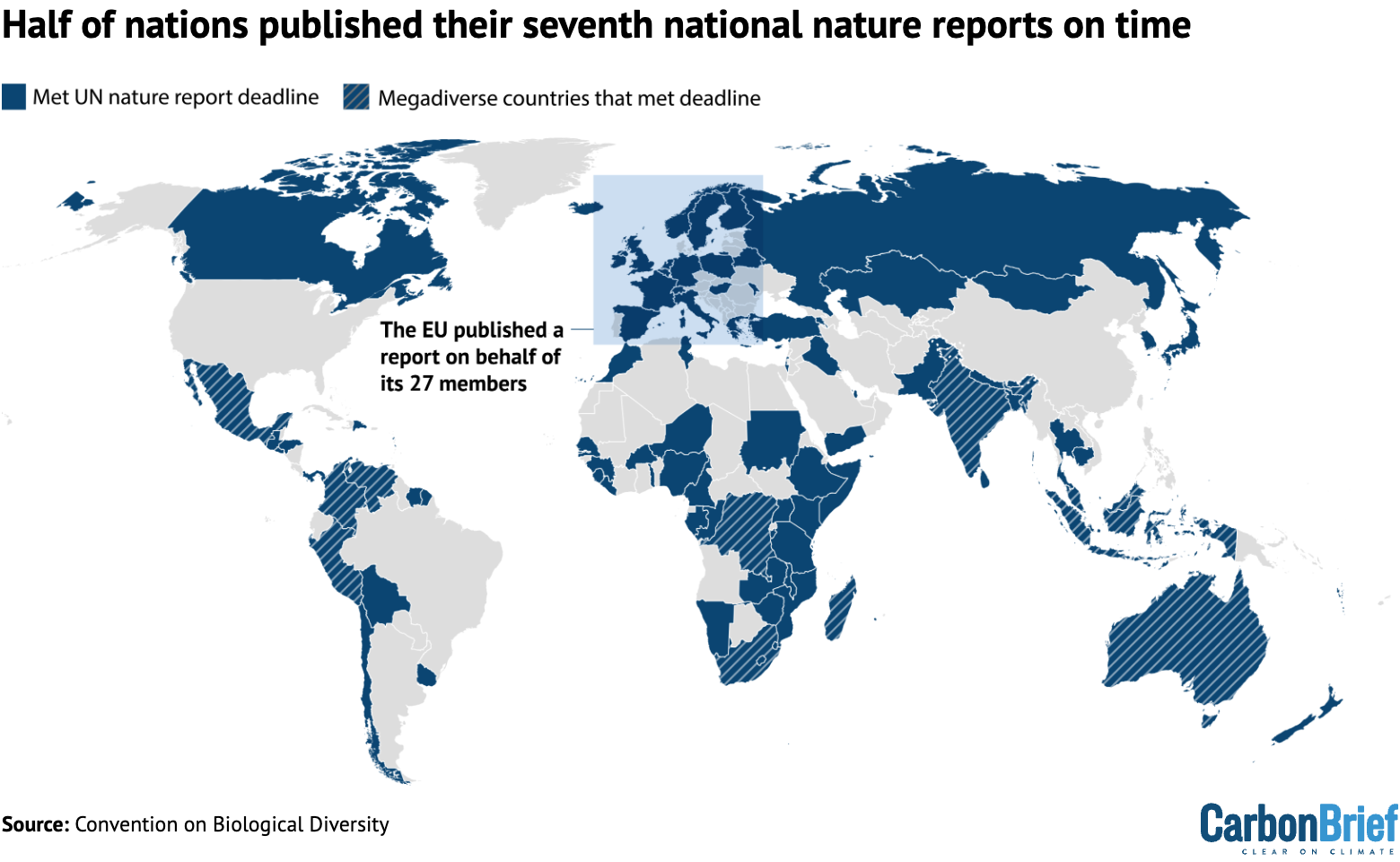
This includes 11 of the 17 “megadiverse nations” that account for 70% of Earth’s biodiversity.
The megadiverse nations to meet the deadline were India, Venezuela, Indonesia, Madagascar, Peru, Malaysia, South Africa, Colombia, Mexico, the Democratic Republic of the Congo and Australia.
It also includes all of the G7 nations (France, Germany, the UK, Japan, Italy and Canada), excluding the US, which has never ratified the Convention on Biological Diversity.
The UK’s seventh national report shows that it is currently on track to meet just three of the GBF’s 23 targets.
This is according to a LinkedIn post from Dr David Cooper, former executive secretary of the CBD and current chair of the UK’s Joint Nature Conservation Committee, which coordinated the UK’s seventh national report,
The report shows the UK is not on track to meet one of the headline targets of the GBF, which is to protect 30% of land and sea for nature by 2030.
It reports that the proportion of land protected for nature is 7% in England, 18% in Scotland and 9% in Northern Ireland. (The figure is not given for Wales.)
National plans
In addition to the national reports, the upcoming global report and review will draw on countries’ national plans.
Countries were meant to have submitted their new national plans, known as “national biodiversity strategies and action plans” (NBSAPs), by the start of COP16 in October 2024.
A joint investigation by Carbon Brief and the Guardian found that only 15% of member countries met that deadline.
Since then, the percentage of countries that have submitted a new NBSAP has risen to 39%.
According to the GBF and its underlying documents, countries that were “not in a position” to meet the deadline to submit NBSAPs ahead of COP16 were requested to instead submit national targets. These submissions simply list biodiversity targets that countries will aim for, without an accompanying plan for how they will be achieved.
As of 2 March, 78% of nations had submitted national targets.
At biodiversity talks in Rome in February, UN officials said that national reports submitted late will not be included in the global report due to a lack of time, but could still be considered in the global review.
Funding ‘delays’
At the Rome talks, some countries raised that they had faced “difficulties in submitting [their national reports] on time”, according to the Earth Negotiations Bulletin.
Speaking on behalf of “many” countries, Fiji said that there had been “technical and financial constraints faced by parties” in the preparation of their seventh national reports.
In a statement to Carbon Brief, a spokesperson for the Global Environment Facility, the body in charge of providing financial and technical assistance to countries for the preparation of their national reports, said “delays in fund disbursement have occurred in some cases”, adding:
“In 2023, the GEF council approved support for the development of NBSAPs and the seventh national reports for all 139 eligible countries that requested assistance. This includes national grants of up to $450,000 per country and $6m in global technical assistance delivered through the UN Development Programme and UN Environment Programme.
“As of the end of January 2026, all 139 participating countries had benefited from technical assistance and 93% had accessed their national grants, with 11 countries yet to receive their funds. Delays in fund disbursement have occurred in some cases, compounded by procurement challenges and limited availability of technical expertise.”
The spokesperson added that the fund will “continue to engage closely with agencies and countries to support timely completion of NBSAPs and the seventh national reports”.
The post Analysis: Half of nations meet UN deadline for nature-loss reporting appeared first on Carbon Brief.
Analysis: Half of nations meet UN deadline for nature-loss reporting
Greenhouse Gases
DeBriefed 27 February 2026: Trump’s fossil-fuel talk | Modi-Lula rare-earth pact | Is there a UK ‘greenlash’?
Welcome to Carbon Brief’s DeBriefed.
An essential guide to the week’s key developments relating to climate change.
This week
Absolute State of the Union
‘DRILL, BABY’: US president Donald Trump “doubled down on his ‘drill, baby, drill’ agenda” in his State of the Union (SOTU) address, said the Los Angeles Times. He “tout[ed] his support of the fossil-fuel industry and renew[ed] his focus on electricity affordability”, reported the Financial Times. Trump also attacked the “green new scam”, noted Carbon Brief’s SOTU tracker.
COAL REPRIEVE: Earlier in the week, the Trump administration had watered down limits on mercury pollution from coal-fired power plants, reported the Financial Times. It remains “unclear” if this will be enough to prevent the decline of coal power, said Bloomberg, in the face of lower-cost gas and renewables. Reuters noted that US coal plants are “ageing”.
OIL STAY: The US Supreme Court agreed to hear arguments brought by the oil industry in a “major lawsuit”, reported the New York Times. The newspaper said the firms are attempting to head off dozens of other lawsuits at state level, relating to their role in global warming.
SHIP-SHILLING: The Trump administration is working to “kill” a global carbon levy on shipping “permanently”, reported Politico, after succeeding in delaying the measure late last year. The Guardian said US “bullying” could be “paying off”, after Panama signalled it was reversing its support for the levy in a proposal submitted to the UN shipping body.
Around the world
- RARE EARTHS: The governments of Brazil and India signed a deal on rare earths, said the Times of India, as well as agreeing to collaborate on renewable energy.
- HEAT ROLLBACK: German homes will be allowed to continue installing gas and oil heating, under watered-down government plans covered by Clean Energy Wire.
- BRAZIL FLOODS: At least 53 people died in floods in the state of Minas Gerais, after some areas saw 170mm of rain in a few hours, reported CNN Brasil.
- ITALY’S ATTACK: Italy is calling for the EU to “suspend” its emissions trading system (ETS) ahead of a review later this year, said Politico.
- COOKSTOVE CREDITS: The first-ever carbon credits under the Paris Agreement have been issued to a cookstove project in Myanmar, said Climate Home News.
- SAUDI SOLAR: Turkey has signed a “major” solar deal that will see Saudi firm ACWA building 2 gigawatts in the country, according to Agence France-Presse.
$467 billion
The profits made by five major oil firms since prices spiked following Russia’s invasion of Ukraine four years ago, according to a report by Global Witness covered by BusinessGreen.
Latest climate research
- Claims about the “fingerprint” of human-caused climate change, made in a recent US Department of Energy report, are “factually incorrect” | AGU Advances
- Large lakes in the Congo Basin are releasing carbon dioxide into the atmosphere from “immense ancient stores” | Nature Geoscience
- Shared Socioeconomic Pathways – scenarios used regularly in climate modelling – underrepresent “narratives explicitly centring on democratic principles such as participation, accountability and justice” | npj Climate Action
(For more, see Carbon Brief’s in-depth daily summaries of the top climate news stories on Monday, Tuesday, Wednesday, Thursday and Friday.)
Captured
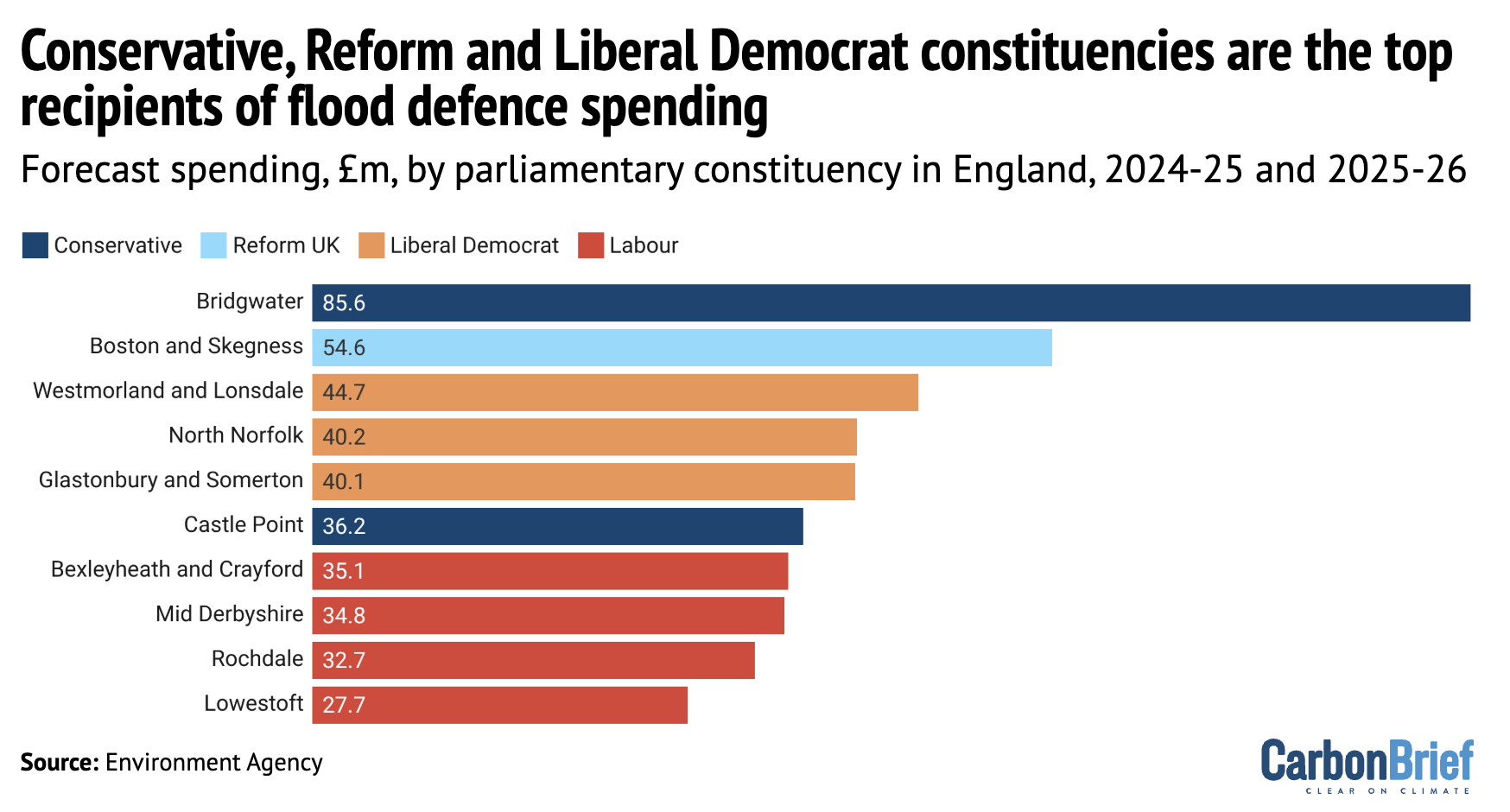
The constituency of Richard Tice MP, the climate-sceptic deputy leader of Reform UK, is the second-largest recipient of flood defence spending in England, according to new Carbon Brief analysis. Overall, the funding is disproportionately targeted at coastal and urban areas, many of which have Conservative or Liberal Democrat MPs.
Spotlight
Is there really a UK ‘greenlash’?
This week, after a historic Green Party byelection win, Carbon Brief looks at whether there really is a “greenlash” against climate policy in the UK.
Over the past year, the UK’s political consensus on climate change has been shattered.
Yet despite a sharp turn against climate action among right-wing politicians and right-leaning media outlets, UK public support for climate action remains strong.
Prof Federica Genovese, who studies climate politics at the University of Oxford, told Carbon Brief:
“The current ‘war’ on green policy is mostly driven by media and political elites, not by the public.”
Indeed, there is still a greater than two-to-one majority among the UK public in favour of the country’s legally binding target to reach net-zero emissions by 2050, as shown below.
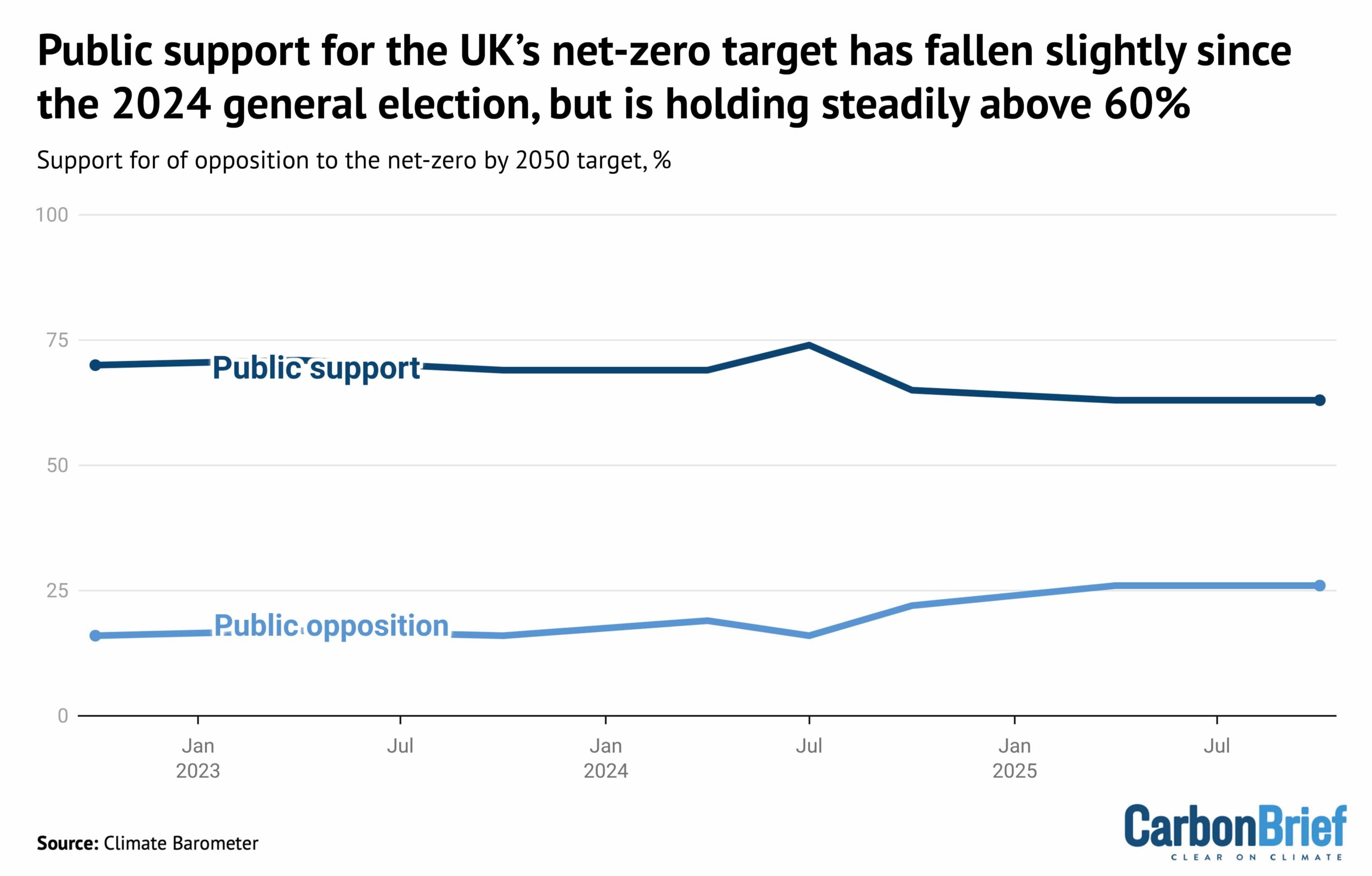
Steve Akehurst, director of public-opinion research initiative Persuasion UK, also noted the growing divide between the public and “elites”. He told Carbon Brief:
“The biggest movement is, without doubt, in media and elite opinion. There is a bit more polarisation and opposition [to climate action] among voters, but it’s typically no more than 20-25% and mostly confined within core Reform voters.”
Conservative gear shift
For decades, the UK had enjoyed strong, cross-party political support for climate action.
Lord Deben, the Conservative peer and former chair of the Climate Change Committee, told Carbon Brief that the UK’s landmark 2008 Climate Change Act had been born of this cross-party consensus, saying “all parties supported it”.
Since their landslide loss at the 2024 election, however, the Conservatives have turned against the UK’s target of net-zero emissions by 2050, which they legislated for in 2019.
Curiously, while opposition to net-zero has surged among Conservative MPs, there is majority support for the target among those that plan to vote for the party, as shown below.
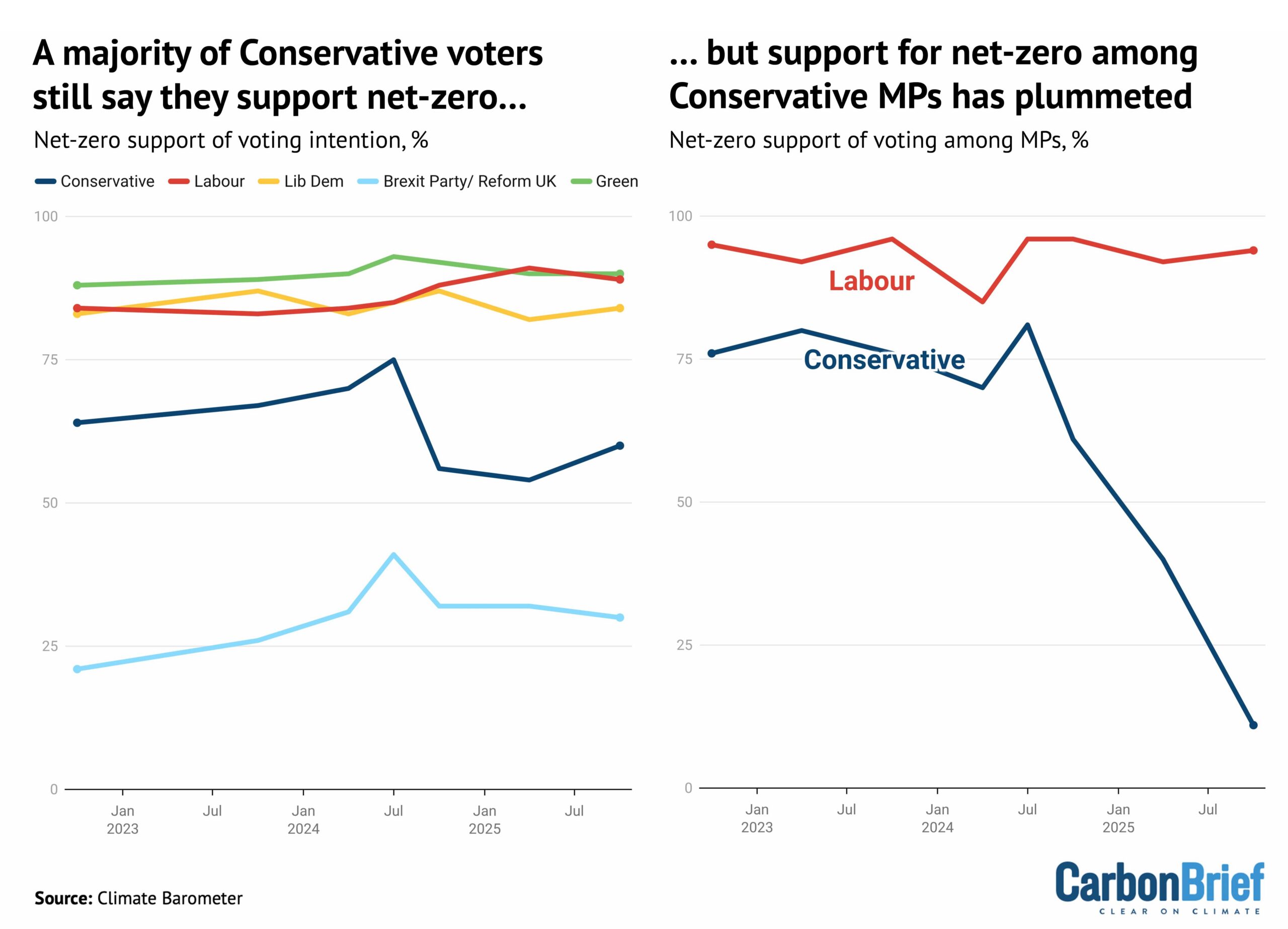
Dr Adam Corner, advisor to the Climate Barometer initiative that tracks public opinion on climate change, told Carbon Brief that those who currently plan to vote Reform are the only segment who “tend to be more opposed to net-zero goals”. He said:
“Despite the rise in hostile media coverage and the collapse of the political consensus, we find that public support for the net-zero by 2050 target is plateauing – not plummeting.”
Reform, which rejects the scientific evidence on global warming and campaigns against net-zero, has been leading the polls for a year. (However, it was comfortably beaten by the Greens in yesterday’s Gorton and Denton byelection.)
Corner acknowledged that “some of the anti-net zero noise…[is] showing up in our data”, adding:
“We see rising concerns about the near-term costs of policies and an uptick in people [falsely] attributing high energy bills to climate initiatives.”
But Akehurst said that, rather than a big fall in public support, there had been a drop in the “salience” of climate action:
“So many other issues [are] competing for their attention.”
UK newspapers published more editorials opposing climate action than supporting it for the first time on record in 2025, according to Carbon Brief analysis.
Global ‘greenlash’?
All of this sits against a challenging global backdrop, in which US president Donald Trump has been repeating climate-sceptic talking points and rolling back related policy.
At the same time, prominent figures have been calling for a change in climate strategy, sold variously as a “reset”, a “pivot”, as “realism”, or as “pragmatism”.
Genovese said that “far-right leaders have succeeded in the past 10 years in capturing net-zero as a poster child of things they are ‘fighting against’”.
She added that “much of this is fodder for conservative media and this whole ecosystem is essentially driving what we call the ‘greenlash’”.
Corner said the “disconnect” between elite views and the wider public “can create problems” – for example, “MPs consistently underestimate support for renewables”. He added:
“There is clearly a risk that the public starts to disengage too, if not enough positive voices are countering the negative ones.”
Watch, read, listen
TRUMP’S ‘PETROSTATE’: The US is becoming a “petrostate” that will be “sicker and poorer”, wrote Financial Times associate editor Rana Forohaar.
RHETORIC VS REALITY: Despite a “political mood [that] has darkened”, there is “more green stuff being installed than ever”, said New York Times columnist David Wallace-Wells.
CHINA’S ‘REVOLUTION’: The BBC’s Climate Question podcast reported from China on the “green energy revolution” taking place in the country.
Coming up
- 2-6 March: UN Food and Agriculture Organization regional conference for Latin America and Caribbean, Brasília
- 3 March: UK spring statement
- 4-11 March: China’s “two sessions”
- 5 March: Nepal elections
Pick of the jobs
- The Guardian, senior reporter, climate justice | Salary: $123,000-$135,000. Location: New York or Washington DC
- China-Global South Project, non-resident fellow, climate change | Salary: Up to $1,000 a month. Location: Remote
- University of East Anglia, PhD in mobilising community-based climate action through co-designed sports and wellbeing interventions | Salary: Stipend (unknown amount). Location: Norwich, UK
- TABLE and the University of São Paulo, Brazil, postdoctoral researcher in food system narratives | Salary: Unknown. Location: Pirassununga, Brazil
DeBriefed is edited by Daisy Dunne. Please send any tips or feedback to debriefed@carbonbrief.org.
This is an online version of Carbon Brief’s weekly DeBriefed email newsletter. Subscribe for free here.
The post DeBriefed 27 February 2026: Trump’s fossil-fuel talk | Modi-Lula rare-earth pact | Is there a UK ‘greenlash’? appeared first on Carbon Brief.
Greenhouse Gases
Analysis: Constituency of Reform’s climate-sceptic Richard Tice gets £55m flood funding
The Lincolnshire constituency held by Richard Tice, the climate-sceptic deputy leader of the hard-right Reform party, has been pledged at least £55m in government funding for flood defences since 2024.
This investment in Boston and Skegness is the second-largest sum for a single constituency from a £1.4bn flood-defence fund for England, Carbon Brief analysis shows.
Flooding is becoming more likely and more extreme in the UK due to climate change.
Yet, for years, governments have failed to spend enough on flood defences to protect people, properties and infrastructure.
The £1.4bn fund is part of the current Labour government’s wider pledge to invest a “record” £7.9bn over a decade on protecting hundreds of thousands of homes and businesses from flooding.
As MP for one of England’s most flood-prone regions, Tice has called for more investment in flood defences, stating that “we cannot afford to ‘surrender the fens’ to the sea”.
He is also one of Reform’s most vocal opponents of climate action and what he calls “net stupid zero”. He denies the scientific consensus on climate change and has claimed, falsely and without evidence, that scientists are “lying”.
Flood defences
Last year, the government said it would invest £2.65bn on flood and coastal erosion risk management (FCERM) schemes in England between April 2024 and March 2026.
This money was intended to protect 66,500 properties from flooding. It is part of a decade-long Labour government plan to spend more than £7.9bn on flood defences.
There has been a consistent shortfall in maintaining England’s flood defences, with the Environment Agency expecting to protect fewer properties by 2027 than it had initially planned.
The Climate Change Committee (CCC) has attributed this to rising costs, backlogs from previous governments and a lack of capacity. It also points to the strain from “more frequent and severe” weather events, such as storms in recent years that have been amplified by climate change.
However, the CCC also said last year that, if the 2024-26 spending programme is delivered, it would be “slightly closer to the track” of the Environment Agency targets out to 2027.
The government has released constituency-level data on which schemes in England it plans to fund, covering £1.4bn of the 2024-26 investment. The other half of the FCERM spending covers additional measures, from repairing existing defences to advising local authorities.
The map below shows the distribution of spending on FCERM schemes in England over the past two years, highlighting the constituency of Richard Tice.
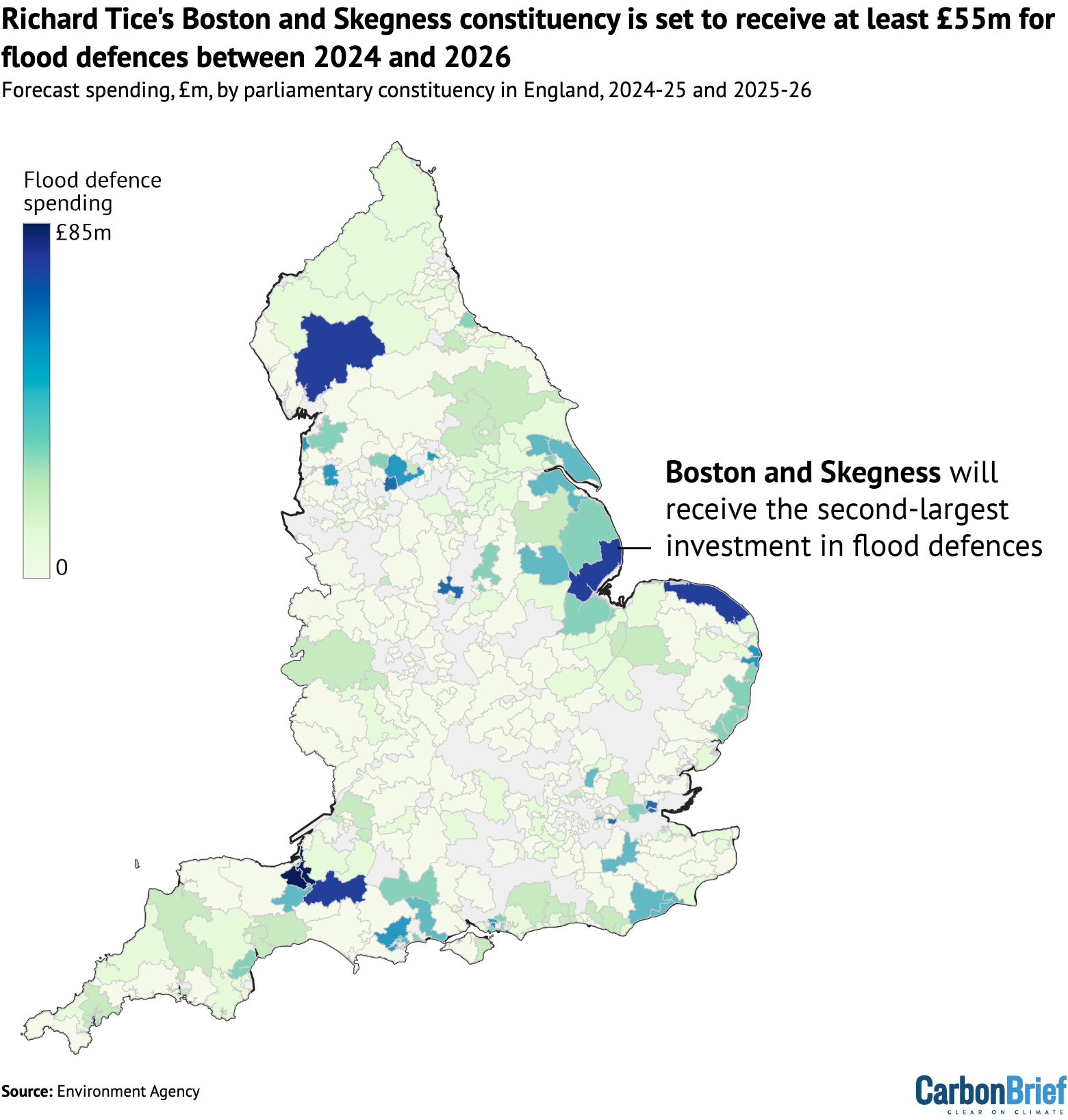
By far the largest sum of money – £85.6m in total – has been committed to a tidal barrier and various other defences in the Somerset constituency of Bridgwater, the seat of Conservative MP Ashley Fox.
Over the first months of 2026, the south-west region has faced significant flooding and Fox has called for more support from the government, citing “climate patterns shifting and rainfall intensifying”.
He has also backed his party’s position that “the 2050 net-zero target is impossible” and called for more fossil-fuel extraction in the North Sea.
Tice’s east-coast constituency of Boston and Skegness, which is highly vulnerable to flooding from both rivers and the sea, is set to receive £55m. Among the supported projects are beach defences from Saltfleet to Gibraltar Point and upgrades to pumping stations.
Overall, Boston and Skegness has the second-largest portion of flood-defence funding, as the chart below shows. Constituencies with Conservative and Liberal Democrat MPs occupied the other top positions.
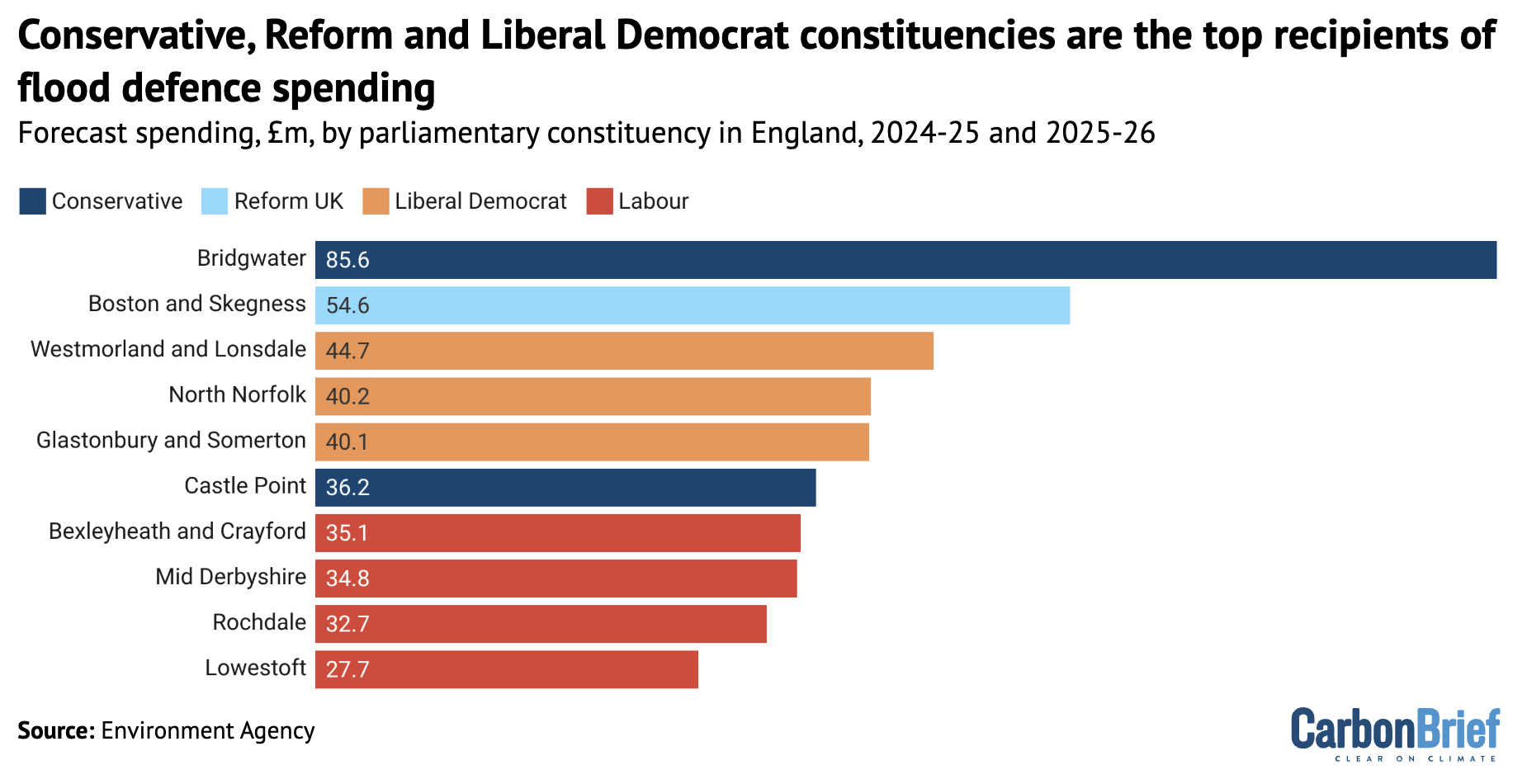
Overall, despite Labour MPs occupying 347 out of England’s 543 constituencies – nearly two-thirds of the total – more than half of the flood-defence funding was distributed to constituencies with non-Labour MPs. This reflects the flood risk in coastal and rural areas that are not traditional Labour strongholds.
Reform funding
While Reform has just eight MPs, representing 1% of the population, its constituencies have been assigned 4% of the flood-defence funding for England.
Nearly all of this money was for Tice’s constituency, although party leader Nigel Farage’s coastal Clacton seat in Kent received £2m.
Reform UK is committed to “scrapping net-zero” and its leadership has expressed firmly climate-sceptic views.
Much has been made of the disconnect between the party’s climate policies and the threat climate change poses to its voters. Various analyses have shown the flood risk in Reform-dominated areas, particularly Lincolnshire.
Tice has rejected climate science, advocated for fossil-fuel production and criticised Environment Agency flood-defence activities. Yet, he has also called for more investment in flood defences, stating that “we cannot afford to ‘surrender the fens’ to the sea”.
This may reflect Tice’s broader approach to climate change. In a 2024 interview with LBC, he said:
“Where you’ve got concerns about sea level defences and sea level rise, guess what? A bit of steel, a bit of cement, some aggregate…and you build some concrete sea level defences. That’s how you deal with rising sea levels.”
While climate adaptation is viewed as vital in a warming world, there are limits on how much societies can adapt and adaptation costs will continue to increase as emissions rise.
The post Analysis: Constituency of Reform’s climate-sceptic Richard Tice gets £55m flood funding appeared first on Carbon Brief.
Analysis: Constituency of Reform’s climate-sceptic Richard Tice gets £55m flood funding
-
Greenhouse Gases7 months ago
Guest post: Why China is still building new coal – and when it might stop
-
Climate Change7 months ago
Guest post: Why China is still building new coal – and when it might stop
-

 Greenhouse Gases2 years ago
Greenhouse Gases2 years ago嘉宾来稿:满足中国增长的用电需求 光伏加储能“比新建煤电更实惠”
-
Climate Change2 years ago
Bill Discounting Climate Change in Florida’s Energy Policy Awaits DeSantis’ Approval
-
Climate Change2 years ago
Spanish-language misinformation on renewable energy spreads online, report shows
-

 Climate Change2 years ago
Climate Change2 years ago嘉宾来稿:满足中国增长的用电需求 光伏加储能“比新建煤电更实惠”
-
Climate Change Videos2 years ago
The toxic gas flares fuelling Nigeria’s climate change – BBC News
-

 Carbon Footprint2 years ago
Carbon Footprint2 years agoUS SEC’s Climate Disclosure Rules Spur Renewed Interest in Carbon Credits

